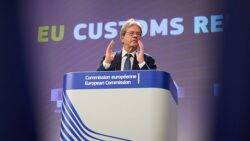Cracking down on circumvention of sanctions has become the number one priority for the European Union.
The loopholes piercing through the European Union’s customs system are helping Russia evade international sanctions and secure blacklisted products from neighbouring countries, according to Paolo Gentiloni, the European Commissioner for the Economy.
“There is a form of sanctions circumvention through trade,” Gentiloni said on Wednesday morning.
“Having different systems country by country allows for those that want to have fraudulent behaviours or those that try to circumvent our sanctions to do so through mechanisms that can easily call as ‘customs shopping.’ You use a point of entry or exit in the (customs) union that you may consider less efficient or (easier) to use.”
The Commissioner admitted the EU did not expect “such a huge task” as the one posed by evasion but appeared confident the bloc would manage to address the shortcomings.
“We can address these challenges only if we strengthen our intelligence, our knowledge, our data on this,” he said.
Gentiloni’s warning comes as the EU and the G7 discuss new plans to crack down on circumvention, a covert phenomenon that has dented the impact of the unprecedented penalties imposed by Western allies on the Kremlin in response to the invasion of Ukraine.
The need to address the issue has become a number-one political priority in Brussels after new trade figures showed a steep increase in EU-made exports sold to countries in Russia’s periphery that are suspected of being re-routed to Moscow in defiance of sanctions.
But member states, which have disparate commercial interests, are conflicted on how far the bloc should go to punish Russia’s enablers, a group that might potentially include key trading partners like China and Turkey. Beijing has already said it would retaliate against “extraterritorial or one-sided sanctions” slapped on Chinese companies.
In his remarks, Gentiloni did not name either China or Turkey and instead referred to three Central Asian countries – Armenia, Kazakhstan and Kyrgyzstan – which have ramped up purchases of EU products in volumes resembling their exports to Russia.
“I’m not finger-pointing at anyone but it is clear,” he said.
Gentiloni addressed the issue of sanctions circumvention while presenting a reform of the EU’s customs union, which was first established in 1968 and gradually removed all tariffs within the single market. Consequently, EU countries have to apply the same customs on their exports so they can travel freely across the bloc’s territory.
But this seamless movement comes with cumbersome administration and fragmented enforcement: according to the Commission, the customs union is managed by over 2,000 offices using 111 separate IT systems, resulting in complex procedures that authorities and companies struggle to understand.
The expansion of safety, environmental and labour standards, which the EU has introduced but other regions in the world completely lack, and the commercial disruption caused by Brexit, the COVID-19 pandemic and Russia’s invasion has further strained the customs union.
The proposed reform aims to set up a brand-new “EU Customs Data Hub” that will be used by all member states to control the flow of imports and exports, including dual-use goods that can be used for both civilian and military purposes.
The plans will also remove the exemption of tariffs for goods valued under EUR150, which the Commission believes is being exploited for fraudulent purposes as e-commerce booms.
The revamp, however, will be lengthy: the use of the centralised data hub will become mandatory only in 2038.





